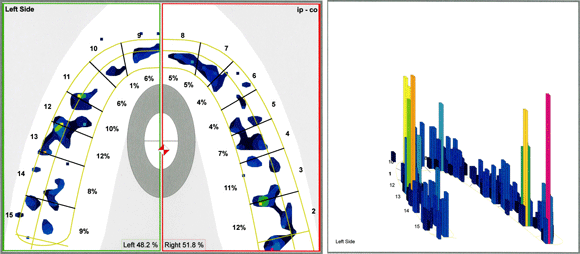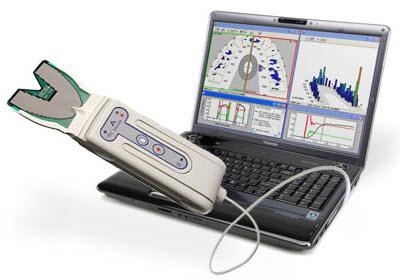T-Scan is a system for digital occlusal analysis consisting of a USB-based handle, proprietary software and patented sensor which shows the timing and amount of force on individual teeth and the stability of the patient's bite.
In a normal term, it is a bite analysis system which measures the efficiency of how teeth come together and separate to protect the natural teeth, restored teeth, implants and muscles.
This is also related to unknown migrant pains along with jaw/neck/shoulder pains. An improper alignment of the teeth and jaw (known as dental occlusion) could be to blame. When the bite is imperfect, the strain is put on the muscles of the jaw and neck, which can cause pain and soreness. For many, a diagnosis of temporomandibular joint disorder (also known as TMD or TMJ) leaves the patient with more questions than answers.

At Dr. Sachdevas’ dental implant India Institute, we understand the pain TMD/TMJ can cause and have unique resources to help our patients – specifically, with this device known as the T-Scan.
For years, dentists have had to use a large amount of guesswork in diagnosing dental occlusion. Imprecise tools such as articulation paper, pressure indicator paste, and waxes were all that was available to evaluate and balance the forces of the bite with the joints and muscles of the head and neck. Most of these methods are not sensitive enough to detect simultaneous contact, and none measure both biting time and force – critical components in diagnosing TMD/TMJ.
Dominant bite areas are pressure points which can cause mild to severe jaw pain, neck pain, or ear pain and can trigger migraines and headaches.
What are the benefits of T scan?
- To improve clinical results with precise data
- To minimise adjustments and repeat visits
- To educate patients occlusion
- To minimise destructive forces
- To determine premature contacts
- To instant documentation
- To enhance patient comfort
- To save time
- The monitor changes in the occlusion over time.
Once a bite pattern is evaluated by our doctors, we develop an individualized treatment plan, including at home exercises.
the figure shows a normal graphic of an occlusion from the software of T-scan.
We repeat the T-Scan every other week to evaluate bite changes until our patient’s bite is even and their pain is alleviated.

Where is necessary?
Implant- Helpful to meet the needs of patients for reliable measurement of occlusal biting forces.
Restorative Dentistry-improperly restored tooth may cause several problems like headaches, TMD related problems, Fracture of tooth/restoration, saves time of finishing the restoration
Temporomandibular disorder
Correction of malocclusion and maintaining the proper bite force.
Clinically useful as a diagnostic screening method for occlusal stability of intercuspal position Oral and maxillofacial surgery.






